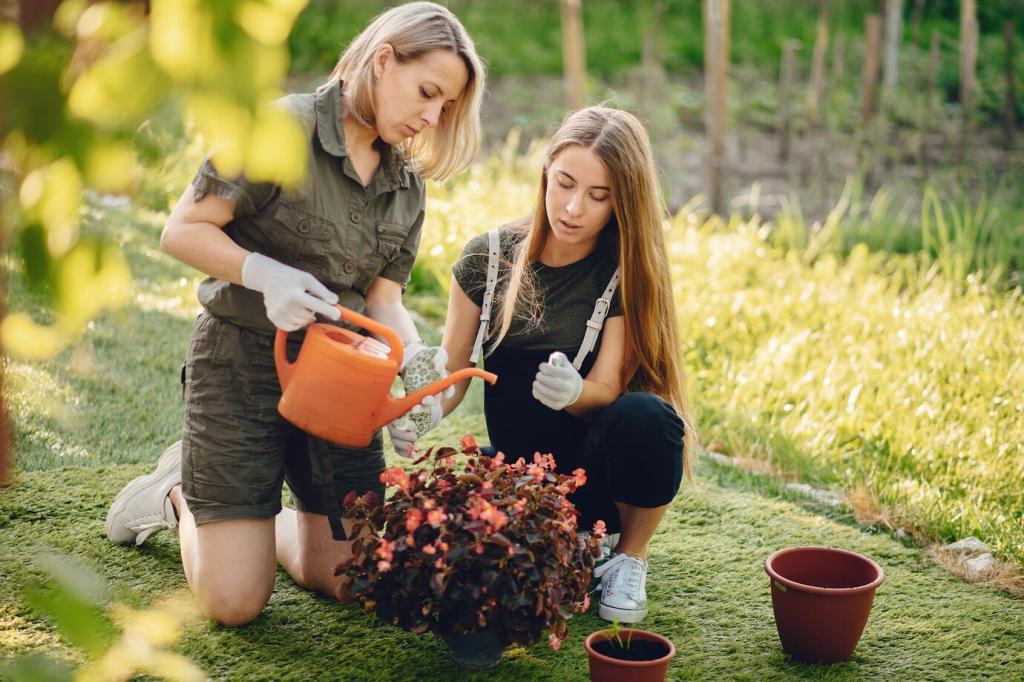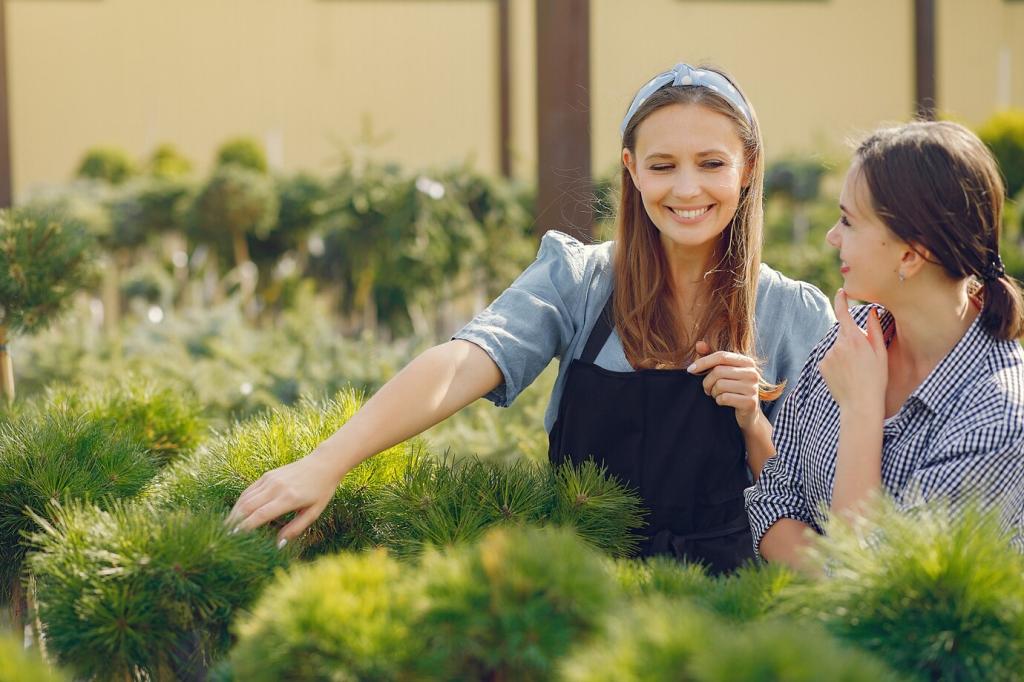
Urban Gardening: Enhancing Mental Well-being
Urban gardening has emerged as a transformative practice for people living in cities, offering a way to reconnect with nature amidst the hustle and bustle. Engaging with plants, soil, and the rhythmic progression of growth not only beautifies urban spaces but also nurtures the mind. This approach has garnered attention from mental health professionals, urban planners, and individuals seeking respite from the pressures of daily life. As a result, urban gardening is more than a hobby—it’s a pathway to holistic well-being, with profound impacts on stress, mood, and personal fulfillment.
The Healing Power of Green Spaces

Being surrounded by plants and greenery can have an immediate soothing effect on the mind and body. Studies show that even brief exposure to natural settings helps lower stress hormone levels, decrease blood pressure, and promote feelings of calmness. In the close quarters of a city, a small balcony garden or even a windowsill adorned with potted herbs can serve as a daily sanctuary. Such exposure can break the cycle of urban overstimulation and offer much-needed psychological relief.
Reducing Stress Through Hands-On Activity
Physical Engagement and Stress Relief
Working with soil and plants engages the body in gentle activity, releasing endorphins and reducing muscle tension. The repetitive tasks of weeding, watering, and pruning can be meditative, providing a structured way to redirect anxious or restless energy. Completing even small gardening tasks can foster a sense of accomplishment and control, significant factors in managing everyday stress. For many, the physicality of gardening serves as a healthy counterbalance to sedentary routines.
Distraction from Daily Worries
The immersive nature of gardening helps to divert attention away from persistent worries or negative thought patterns. Being absorbed in the process of nurturing plants allows daily problems to recede into the background, even if temporarily. This effective distraction not only interrupts rumination but also provides an opportunity to reframe concerns in a more positive light when one returns indoors. Over time, these regular intervals away from stressors can aid in building mental resilience.
Creating a Personalized Retreat
Urban gardens, regardless of their size, can be customized to reflect personal tastes and aspirations. Whether someone prefers the orderly rows of a vegetable patch or the wild beauty of a pollinator-friendly flowerbed, these spaces become deeply personal sanctuaries. Designing and maintaining a garden to individual specifications instills a sense of agency and ownership, pivotal in reducing feelings of helplessness that may arise from an impersonal urban environment.
The Garden as a Meditation Space
A garden can become a natural setting for mindfulness meditation, where one can quietly observe the rhythms of nature. The act of watching seeds sprout or noticing the gradual changes in foliage throughout the seasons encourages a contemplative mindset. Such observations deepen an appreciation for life’s cycles, promoting patience and acceptance. These meditative moments can counteract the constant mental stimulation of urban life, inducing calmness and clarity.
Fostering Attention and Precision
Tending to plants requires close observation and responsive action. Whether checking for pests or assessing soil moisture, these tasks demand focused attention and a delicate touch. Practicing such careful observation improves concentration, a skill that often deteriorates in the age of multitasking. This increase in attentional capacity learned in the garden can prove beneficial when tackling other demanding tasks in daily life.
Encouraging Emotional Regulation
Urban gardening provides numerous opportunities to experience and regulate emotions. The satisfaction of nurturing a flourishing plant, or the disappointment of failed seedlings, teaches resilience in the face of fluctuating outcomes. This practice of acknowledging and working through emotional responses in the garden can translate into improved emotional regulation and adaptability outside it, leading to greater overall mental equilibrium.
Building Self-Efficacy and Purpose
Setting Achievable Goals
Gardening projects, of any scale, can be broken down into manageable steps—whether it’s sowing seeds, transplanting, or harvesting. Each task completed brings with it a visible result, reinforcing the sense of progress. This goal-oriented process empowers individuals to take initiative and manage projects, even in the face of setbacks. By seeing clear evidence of their efforts in a thriving plant bed or a basket of fresh produce, urban gardeners reinforce a positive sense of agency.

Community Gardens as Gathering Places
Community gardens serve as communal hubs where people from different backgrounds unite over a shared love of plants and nature. These spaces encourage collaboration and shared responsibility, making them incubators for new friendships and mutual support. Participating in communal gardening projects also facilitates knowledge exchange and skill-sharing, fostering a spirit of mutual growth that enhances social bonds and well-being.
Intergenerational Learning and Support
Gardening naturally bridges the gap between generations, as older gardeners pass down wisdom and younger participants bring fresh perspectives. Such interactions create mentoring opportunities and strengthen family ties, which are often strained in urban settings. Through gardening, individuals learn patience, respect for experience, and openness to innovation—all while building relationships that contribute to resilience against isolation and loneliness.
Celebrating Diversity and Inclusion
Urban gardening initiatives often attract participants from diverse cultural and socioeconomic backgrounds. The collective effort to green city spaces creates common ground, breaking down social barriers and encouraging inclusion. Inclusive gardening projects honor cultural traditions in plant selection and cultivation, fostering respect and understanding among neighbors. These rich interactions deepen the feeling of belonging, reinforcing the crucial connection between community, inclusivity, and mental health.
Previous
Next
Designing Unique Green Spaces
Every urban gardener approaches their space with a unique vision, choosing colors, textures, and plant varieties to reflect personal tastes. This creative process involves problem-solving to maximize limited space, experiment with containers, and coordinate seasonal blooms. Such acts of design and improvisation transform mere patches of dirt into living works of art, sparking joy and pride in their creators.
Nurturing Curiosity and Exploration
Gardening brings constant opportunities for discovery, from learning about plant biology to experimenting with new growing techniques. This spirit of inquiry stimulates the mind and encourages lifelong learning, attributes that keep mental faculties sharp and engaged. Through exploration and experimentation, gardeners feed their curiosity and maintain a positive, growth-oriented mindset.
Finding Inspiration in Nature’s Patterns
Close observation of plant development and growth cycles fosters a sense of wonder and inspiration. Patterns in leaves, the intricacies of pollinators, and seasonal changes all serve as creative fuel. For writers, artists, and thinkers, time spent in the garden is often mirrored by bursts of new ideas and perspectives. This synergy between the natural world and human creativity contributes to a refreshing, inspired state of mind.
Sustainability and Environmental Stewardship
Understanding Ecological Impact
Through first-hand experience, urban gardeners gain insight into the interconnectedness of plant, animal, and human life. Observing how gardens attract pollinators and improve air quality demonstrates the direct impact that even a small plot can have on urban ecosystems. This awareness translates into a deeper sense of responsibility and a desire to make conscious choices, reinforcing the value of stewardship in daily life.
Practicing Sustainable Gardening Techniques
Many urban gardeners adopt eco-friendly practices such as composting, water conservation, and the use of organic methods. These efforts reduce waste and chemical usage, lessening the ecological footprint of urban living. Embracing such sustainable methods provides a sense of integrity and purpose, as every action fosters a healthier planet and community. This alignment with environmental values supports long-term psychological well-being.
Leaving a Legacy for Future Generations
By investing time and effort into urban gardens, individuals contribute to a greener cityscape for current and future residents. The act of planting trees, restoring vacant lots, or mentoring new gardeners creates a legacy of care and improvement. Knowing that these efforts will benefit generations to come imparts lasting meaning and hope, counterbalancing feelings of anxiety about the urban environment or the future. This long-term perspective cultivates resilience and a positive outlook.
